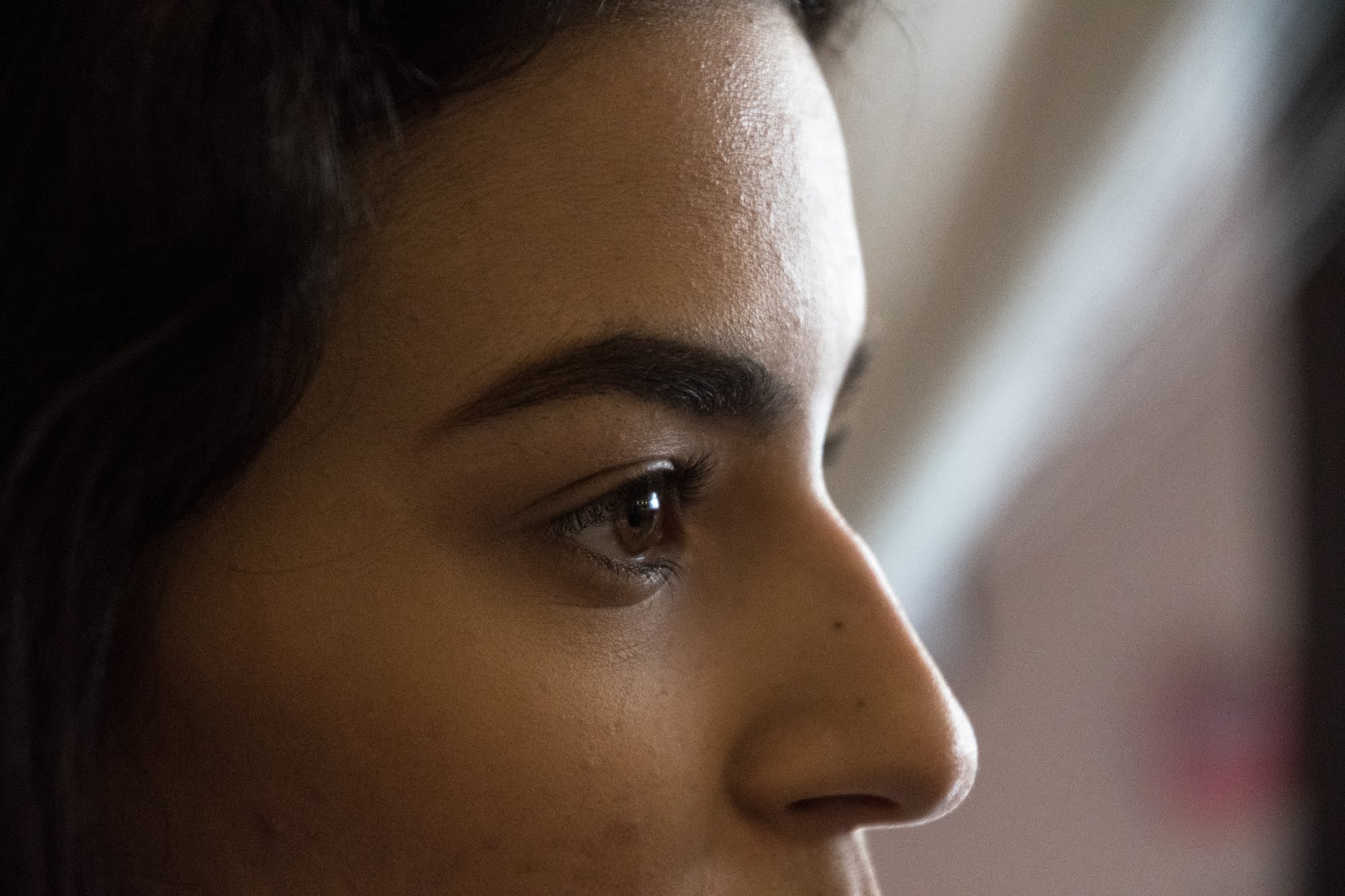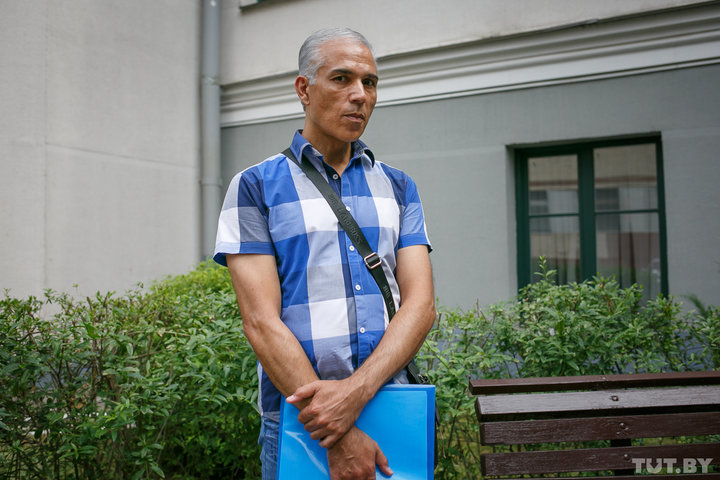Iranian faces potential execution if deported from Belarus

Mehrdad Jamshidiyan with his wife Alena (left) / photo from the family archive
Belarusian citizenship and migration authorities have decided to deport Iranian Mehrdad Jamshidiyan. At home, he is accused of double murder. In addition, contrary to the laws of the Islamic Republic, the man adopted Christianity in Belarus. And now he is facing death penalty for this.
Mehrdad argues that the Iranian authorities have falsified murder charges. He believes that he is being persecuted for political reasons.
Over the past few years, the Iranian authorities have repeatedly appealed to Belarus to extradite Jamshidiyan, but the Belarusian Prosecutor General’s Office refused. Now, an Iranian citizen will still have to leave: they decided to deport him for violating the regime of his stay in Belarus.
Media and human rights activists write that Belarus actually is sending Mehrdad Jamshidiyan to certain death. Is the threat really that serious? Is it possible in this case to punish the Iranian for the violations, without deporting from our country?
And finally: Iranian investigators claim that strong evidence has been gathered against Mehrdad. Why then is he not being extradited from Belarus as a potential murderer and deported to Iran for an administrative offense? Euroradio is trying to figure out this difficult situation, in which only one step remains before a possible tragedy.
“I have nothing to hide, I did not kill”
Mehrdad Jamshidiyan arrived in Belarus in 1993 and initially did not plan to stay for a long time, but he met his future wife Alena and stayed here. The eldest daughter of the Jamshidian family, Katrina, was born already in 1994.
“My parents have been married for many years. They are an example of a happy and strong family for me,” says Diana, who is 19 years old. She is the youngest daughter of Merhdad.
Mehrdad was not able to get Belarusian citizenship. According to human rights activist Nasta Loika, the family could not rent an apartment under the agreement, thus Jamshidiyan did not have registration. In 2011, Belarusian law enforcers deported him for a year to Iran because of his illegal stay in the country.
In 2012, when Jamshidiyan returned to Belarus, Iran requested his extradition. At home, he was accused of murdering his brother brother Ismail and mother Azam during his stay in Iran. Ismail was a member of the Iranian opposition and a member of the 'Green Revolution' party. He and his mother were found immured in a wall. Double murder in Iran can be punishable by death.
Diana remembers the day her father was informed about the murder of her mother and brother:
“When I came home, my father sat there with tears in his eyes. Mom said that my grandmother and uncle had been killed. Dad was very worried. Just a couple of days later, Iran sent documents to Belarus, and Father was detained. Then he said: “Do not worry. I will go because I have nothing to hide, I did not kill.”
My Father spent about a year in custody. The Belarusian side requested information explaining the reason for his potential extradition. Iran did not provide the necessary documents. Belarus could no longer keep his father imprisoned, he was released.”
New detention
Back in the 2000s, Mehrdad renounced Islam and converted to Christianity. During the first deportation from Belarus in 2011, Iran did not know about it. In Iran apostasy may be punished by the death penalty. In 2016, Mehrdad tried to get refugee status in Belarus, but he was refused. In 2017, the UN Human Rights Committee recognized that in Iran Jamshidiyan may face torture and death.
According to Diana, in 2016, Mehrdad's Iranian passport expired, so he could not renew his registration in Belarus. He was afraid to go to the Iranian embassy to get a new passport. In June 2018, the Belarusian police detained him for illegal stay in the territory of Belarus.
Jamshidiyan spent nine months in the remand prison. There he started a hunger strike, but the family, through a lawyer, asked him not to do it.
“On March 7, [2019], we came to the Citizenship and Migration Department, where we were told that Iran had sent confirmation that the Father was a citizen of Iran. It was decided to deport him. I pleaded, I sat and cried, I was very upset. It was shocking to find out after nine months that Iran had in fact sent the documents.
Well, let this deportation happen, we will do everything in our power, we will appeal, submit requests to higher authorities. But I asked them to let my Father go at least for a while so that he would stay with us.”
The only way out is to seek asylum in another country

According to Ales Mikhalevich, Belarus has the right to deport Mehrdad not only to Iran, but also to another country. But there is an obstacle: the Iranian does not have a valid passport with which he could cross the border of another state.
“The absence of a passport is a significant limitation. The only way out for him is to go to a neighboring country and ask for political asylum there. But he is in custody, this is also a limitation. However, in theory, he is to be sent to Iran through some other country, because there are no direct flights between Minsk and Tehran.”
Human rights activist Nasta Loika told Euroradio that Belarus requested a transit permission from Russia.
“In this case, he must be escorted to a flight to Russia, but here the question arises of how he will be met there,” Mikhalevich said. "In theory, they are not allowed to meet him in custody. But in practice it could be otherwise. Often, Belarus and Russia use deportation to de facto extradite."
A country always has different ways out of the situation. I see no problem for Belarus to just take him to the Ukrainian, Polish or Lithuanian border for him to ask for political asylum there. Belarus can easily release his, issue a one-time or non-one-time document so that he would cross the border. ”
The Department for Citizenship and Migration of the Ministry of Internal Affairs has confirmed to Euroradio that the decision on deportation had been made, but refused to comment further. The decision can still be appealed. The human rights organization Amnesty International has spoken out in defense of Jamshidiyan and urged Belarus not to expel him to Iran.




















